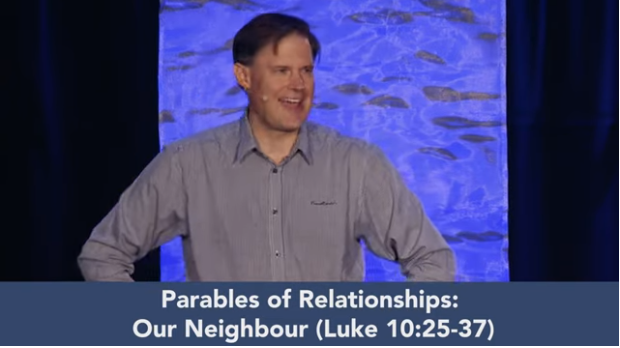During the European Leadership Forum held from May 20 to 26, 2022, the speaker Peter J. Williams delivered a series of four talks based on the parables of relationships in the Gospel of Luke. His talk on 22 May, titled ‘Our Neighbour’, examined the parable of the Good Samaritan and encouraged listeners to reach out across ethnic boundaries with deeds of love.
Peter Williams, Principal and CEO of Tyndale House, an international research center and library for biblical studies in Cambridge, preached on Luke 10:25–37 as his first talk on the parables of relationships at the Plenary Sessions of the European Leadership Forum.
Williams, Affiliated Lecturer in the Faculty of Divinity at the University of Cambridge, revealed rich details in the setting of this parable. Reviewing the context of Luke 10, Williams guided the listeners to see that before telling the parable, Jesus had sent 70 disciples out to ‘every village’, who came back gladly because even demons obeyed the name of Jesus. Jesus replied that disciples should be most glad that their names are written in heaven, and thanked God that He’s hidden things from the wise and understanding and revealed them to infants (10:21-22).
“That is the context for the entry of an expert in the Law: God has revealed these things to little children and the really clever people have not understood”, said Williams.
Immediately after the parable of the Good Samaritan was the story of Mary and Martha, which reminds Bible readers that the humanitarian work implied in the parable is not the Gospel itself. Rather, according to Williams, this parable must be understood in light of the Gospel and with a focus on the Gospel.
Taking a closer look at the narrower setting (10:25-37), Williams pointed out that this conversation between Jesus and the Jewish law expert followed a pattern of ‘lawyer’s question - Jesus’ counter question - lawyer’s statement - Jesus’ statement (practical instruction)’. He noticed in particular that the Jewish legal expert had good knowledge of the Scripture but corrupt motives, that is, to show off his own righteousness.
The Jewish legal expert provided a perfect answer for ‘what is written in the Law’, while Jesus replied with an instruction, “Do this and you will live”. Williams helpfully pointed out that by this reply, Jesus showed this man’s guilt in two ways. Firstly, it is practically impossible to obey this commandment. Secondly, what Jesus said comes from the Old Testament (Genesis 42:18), spoken by Joseph to his brothers, who were guilty of stripping and abandoning Joseph. Interestingly, this echoes with the injured man’s experience in the Good Samaritan parable.
“How would you retell this story for today? “ asked Williams. He said first this story presents a double commandment for listeners: we need to neighbor not only the injured man on the road but also the Samaritan. This story revealed that our neighbors could be our enemies, people from a different ethnic group who were against us. And love reaches across ethnic divisions, even in times of conflict. “Politically, we may side with Ukraine. But when it comes to loving our neighbor, we need to know that there are no exceptions - not even for Russians.”
Secondly, Williams warned that humans like to justify themselves, like the legal expert. Likewise, we like to turn to semantic discussions, such as defining a neighbor. “We would love to have semantic discussions about the meaning of the word neighbor but not apply the text to ourselves to the context. We want to have manageable righteousness”, said Williams, “We need to remember the Gospel, and the Gospel says our righteousness only comes from Christ.”
Humanitarian efforts are necessary and meaningful as a way to show love and reach across boundaries. However, Williams reminded the participants that humanitarian work can exist without love or the Gospel and that the following story, Mary and Martha, shows that Jesus’ word has the highest priority.
With Europe rocked again by war and various parts of the world facing the severest humanitarian crisis ever, Williams said, the politicians don’t really have an answer, while we Christians have. “We can reach across through the Gospel, across every boundary, because people are in need and we have the Gospel which is the answer to their need.”












